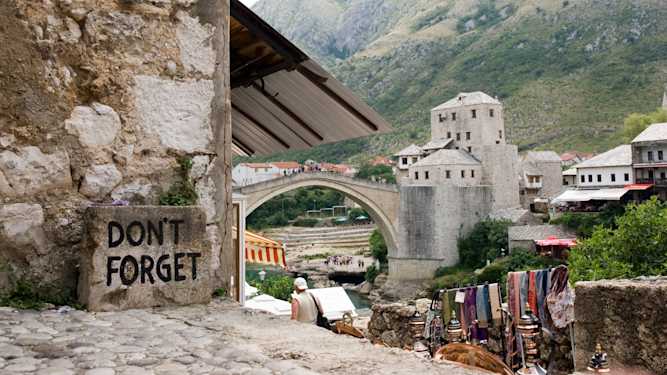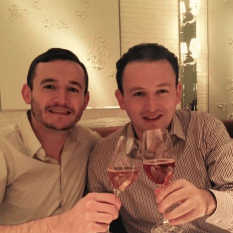
Bosnia 2025 - January
Throughout 2025, Ian Bancroft is collecting reflections on Bosnia-Herzegovina thirty years on from the end of the war. These reflections, supplemented by other insights and stories, explore various dimensions (peacebuilding, reconciliation, culture, education, politics), while reflecting on the past and the future.
To contribute your reflections on Bosnia-Herzegovina, please click here.
Another anonymous contributor, this time from Tuzla, explains how ‘Bosnia-Herzegovina is now roughly where it was 30 years ago’. ‘The country has been turned into a reserve, isolated from the rest of the continent and left to the care of local powerful people’, the source asserts, adding that there is widespread stagnation or regression. ‘The worst thing is that during the war and immediately after it, we at least thought that things would get better someday’, they continue, adding that, ‘today we know that they won't and that we can't change anything’. By means of analogy, the source compares the country today to ‘an old video recorder when you press pause - the image shakes but does not move, the head spins but the VHS tape stops’. ‘At some point, the head will destroy the tape’, they add. ‘Nothing makes me optimistic, everything I see around me makes me pessimistic’, they conclude.
If you want to appreciate the complexities of Bosnia-Herzegovina’s institutional make-up, take the issue of education. In a country of less than 3.5 million people, there are 13 ministers of education - one in the Federation, one in Republika Srpska, one in Brcko District, and one in each of the 10 Cantons. Yet it is the fourteenth but missing one that sums up Bosnia-Herzegovina; the country doesn’t have a state level ministry of education. Instead, each ministry operates autonomously, absent a unifying national vision or strategy. It is fragmentation par excellence, one that impacts future generations throughout the country. And as with so much here, it is seemingly immune to change.
I had the pleasure of speaking with Mustafa Hadžiibrahimović, a lecturer, journalist, and documentary maker, who was briefly imprisoned in the notorious Luka camp in Brčko, where over 1,000 Bosniaks would be murdered. It is a trauma that is still ripe. In his memoirs, he talks about an almost perfect existence in Yugoslavia before the war. In the early years, he spent a yer and a half ‘behind enemy lines’. As the only Bosniak child left in the neighbourhood, he didn't want to go to school. Eventually, he managed to leave for the Netherlands, which has been his home ever since. They are, in his words, ‘a typical Bosnian family scattered all over the world - in the Netherlands, Denmark, Germany, Austria, UK, Italy, US, Australia, and Spain’. Mustafa tells me that no one is happy where Bosnia is right now - ‘that it deserves better, that its people deserve better’. ‘We are encaged by the Dayton Accords’, he begins, adding that ‘it was good for giving peace a chance, for ending the war, but it is not a good ground for helping the country further’. He insists that Bosnia-Herzegovina is still ‘occupied - half by Republika Srpska and part of the Federation by Croatia’. ‘They're still involved in Bosnia and do not want to leave as alone’, he continues, ‘This makes life hard. Serbia and Croatia still want a part of Bosnia.’
Despite this, Mustafa feels that the international community is keen to maintain the status quo. He recalls the arms embargo under which Bosnia-Herzgovina had to try to defend itself. ‘It is a miracle that parts of Bosnia are still Bosnia thanks to boys and girls defending their cities’, he reflects.He pauses for a moment. ‘You might think this is a radical point of view, but I think it is because we are Muslims’, he muses; ‘part of Europe where Muslims live is not part of Europe’. Again he stops. ‘I don't like the term Islamophobia, but I can't come to any other conclusion’, he surmises; ‘and yet, we are a European culture with some Ottoman ingredients - Bosnia is the heart of Europe’.
Despite this seemingly pessimistic tone, he is resolute about Bosnia-Herzegovina’s future. ‘Our resilience is incredible - I don't think, Bosnia will ever fall apart. It is not Yugoslavia, after all’, he declares without hesitation. ‘Bosnia is a one thousand year old entity’, he reminds me, ‘we have history, heritage, high culture - amazing music, food, and people’. A producer advocate for this country I am yet to meet. His words are such that he worries that I will deem him a nationalist.
And yet he returns to the straightjacket of identity considerations as if drawn inextricably to this very question. ‘There are Bosnian Christians, Bosnian Orthodox, mixed marriages’, he begins, but ‘it is difficult for those who love Bosnia.’ ‘If you ask me whether I want to be Bosniak or Bosnian, I prefer to be Bosnian’, he sighs, ‘but it is meaningless in the in the country's context - it is an apartheid state and it makes me sick’. ‘Dayton makes people sick - it makes me sick’, to reiterate the point.
Another anonymous contributor (many are keen to preserve their anonymity for personal or professional reasons) cites the failure of the April 2006 package of constitutional reforms as one of the biggest missed opportunities in the last thirty years. The package would have, among other things, strengthened the powers of the Prime Minister, while simplifying legislative processes, thereby enhancing governance and accountability. It constituted, in effect, the first in a series of phases of constitutional reform that would move Bosnia-Herzegovina away from the cumbersome but once-necessary Dayton-imposed structure. A broad consensus had been forged through painstaking consultations with the country’s myriad layers of government. Ultimately, the package fell short of the two-thirds majority by only two votes. Many presumed the package would be reintroduced after that autumn’s general elections. Instead, it has rarely been mentioned since.
When I ask for reflections about Bosnia-Herzegovina thirty years on from the end of the war, it is interpreted or implied that I am striving for something negative. For many, it is taken for granted that there is nothing good to say; unless the absence of violence is acknowledged as such. And yet there are more positives than one might imagine.
To contribute your reflections on Bosnia-Herzegovina, please click here.
You can also contact Ian directly by clicking here.
Ian is a writer based in the Balkans. He is the author of 'Dragon's Teeth - Tales from North Kosovo' and 'Luka'. Follow Ian on Twitter @bancroftian.
Currently in: Belgrade, Serbia — @bancroftian
